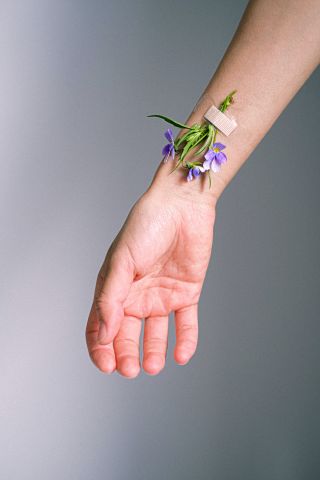Stress
Self-Care: A Band-Aid for a Deeper Wound?
Is prescribing self-care as a cure for stress too little, too late?
Posted February 16, 2023 Reviewed by Vanessa Lancaster
Key points
- COVID-19 has caused the restructure of various areas in society.
- Society has long prescribed using self-care strategies to get through times of adversity.
- Utilizing intentional practices like meditation and walking while restructuring our worldview may improve psychological wellness.

By Britt Duncan, M.A. and Douglas E. Lewis, Jr., Psy.D., on behalf of the Atlanta Behavioral Health Advocates
How does one move forward while continuing to bleed out? The United States and its citizens developed a proverbial wound in early 2020 with the outbreak of coronavirus (COVID-19). During the early months of the crisis, millions of people across industries lost their jobs.
For nearly a year, considerable needs remained unmet, with 20 million households facing issues related to food scarcity and housing debt. On March 11, 2021, Americans received just $1,400 for their financial struggles over the previous year, with another installation of payment given later that same year. There has also been significant personal loss, with over one million deaths from COVID-19. How do we move forward with our collective grief?
A step to any healing begins with acknowledgment. COVID-19 came and is still here, with over 300,000 cases reported in January 2023. With the States "reopened" and vaccinations available, it may feel for some that COVID-19 is no longer a threat.
For so many of us in 2020, our lives were transformed in a matter of days and have not been the same since. We are collectively traumatized, with loss touching nearly every facet of our lives. We’ve all adopted various coping techniques to adjust to this new way of life. Some people employ the use of denial where in their world, COVID-19 is gone, and their lives remain the same. Some people have yet to engage socially in the world as they once did, often due to fear.
Research shows that up to 50 percent of people experience mental health challenges (including anxiety) after recovering from the disease. All of these defense mechanisms are typical, and we must remain compassionate to those around us. We are collectively in a period of adjustment or transition as COVID has drastically shifted our world. COVID has caused a deep, active wound in our world, so what is next?
Society has long prescribed using self-care strategies to get through times of adversity. Self-care has been consistently defined as providing adequate attention to one's own physical and psychological wellness. Notably, 41 percent of adults in the U.S. reported symptoms of anxiety and depressive disorders in January 2021, an increase of 30 percent from 2019.
How can we care for ourselves in a way that addresses all areas impacted by our metaphorical wound while knowing that we continue to be at risk with each venture outside? Perhaps acknowledging that we, as a nation, are currently in a post-traumatic adjustment period can start the journey toward collective healing. Adapting to a new set of cultural expectations and social norms is never easy. The adequate tending to our physical and psychological needs through hanging with friends, relaxation, exercise, or meditation may feel like a Band-Aid for our wounds, but completing these activities beats the alternative of burning out.
The best we all can do may feel like nothing when we consider the loss that some of us have faced. We are in a collective period of transition. We must grapple with the loss of loved ones and relationships, impacted finances, targeted gun violence, and constant, vicious news and media cycles. It may feel futile to implement self-care to cope with such overarching problems. However, as a practice of compassion, for the time being, we must celebrate the small wins that work towards healing our wounds.
Here are some ways you can prioritize your mental health during these challenging times:
- Self-care may be understood as pampering for some–however, true self-care incorporates lifestyle changes that require continuous attention to your needs. This highlights the importance of therapy so that you can identify what those needs are.
- Utilization of intentional practice such as meditation, walking, or even bibliotherapy. Take care of yourself by using media (books, television, movies), nature, or friends to improve your well-being.
- We can protect and heal ourselves by implementing boundaries with ourselves and others. By practicing boundary setting, whether at work or in your personal life, you can protect yourself and show respect to others.
References
Ali, S. (2019, January 22). Is self-care just a trend? Psychology Today. Retrieved November 29, 2022, from https://www.psychologytoday.com/us/blog/modern-mentality/201901/is-self-care-just-trend
Boundaries and self-care. Hazelden Betty Ford Foundation. (n.d.). Retrieved November 29, 2022, from https://www.hazeldenbettyford.org/articles/cleantis/self-care-skills-relationships
Centers for Disease Control and Prevention. (n.d.). CDC Covid Data tracker. Centers for Disease Control and Prevention. Retrieved November 29, 2022, from https://covid.cdc.gov/covid-data-tracker/#datatracker-home
Lebow, H. I. (2022, January 11). What is post-covid anxiety? Psych Central. Retrieved January 23, 2023, from https://psychcentral.com/anxiety/anxiety-after-covid#what-is-it
Panchal, N., Kamal, R., Cox, C., & Garfield, R. (2022, April 28). The implications of COVID-19 for mental health and substance use. The Implications of COVID-19 for Mental Health and Substance Use. Retrieved November 29, 2022, from https://www.kff.org/coronavirus-covid-19/issue-brief/the-implications-of-covid-19-for-mental-health-and-substance-use/
Sussex Publishers. (n.d.). Bibliotherapy. Psychology Today. Retrieved November 29, 2022, from https://www.psychologytoday.com/us/therapy-types/bibliotherapy
Tracking the COVID-19 economy's effects on food, housing, and employment hardships. Center on Budget and Policy Priorities. (n.d.). Retrieved November 29, 2022, from https://www.cbpp.org/research/poverty-and-inequality/tracking-the-covid-19-economys-effects-on-food-housing-and
United States COVID Statistics. Worldometer. (n.d.). Retrieved November 29, 2022, from https://www.worldometers.info/coronavirus/country/us/


